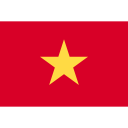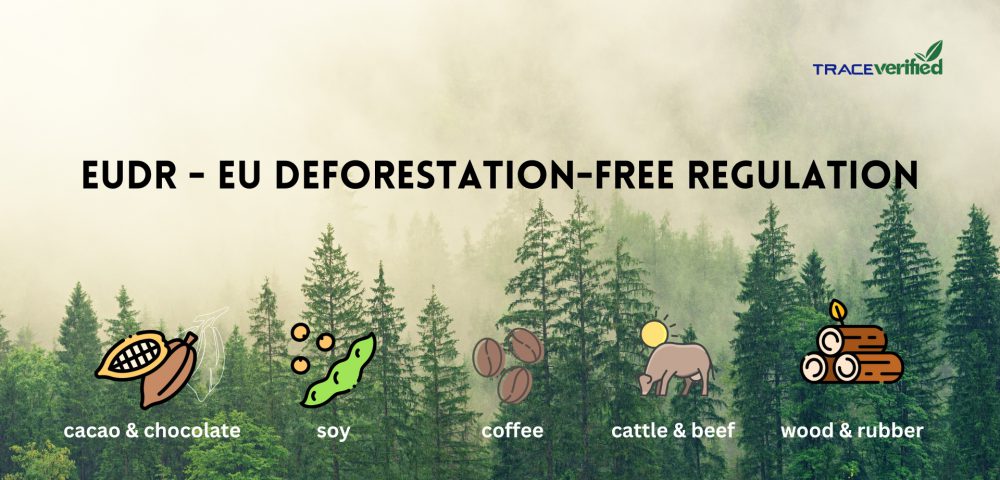-
EU Deforestation-Free Regulation?
The EU Deforestation-Free Regulation (EUDR) aims to combat deforestation caused by forestry and agricultural activities worldwide.
This regulation, set to introduce new mandatory requirements in 2024, will replace the European Union Timber Regulation (EUTR) and extend its scope for EU businesses.
Europe is one of the largest import markets for commodities linked to deforestation, including 50% of global coffee and 60% of cocoa. These commodities alone accounted for over 25% of global tree cover loss between 2001 and 2015. Given its significant market presence, the deforestation regulation seeks to reduce the impact of EU citizens’ consumption on forests and forest areas worldwide. As a crucial step towards a deforestation-free future, the EU aims to lead by example. Similar regulatory requirements could be implemented in other markets, including the United Kingdom.
-
Who is affected by the EUDR?
Similar to the 2010 European Union Timber Regulation, the EU Deforestation-Free Regulation (EUDR) imposes mandatory compliance on producers and traders. Specifically, companies will be required to conduct supply chain assessments to ensure they do not engage in production on deforested or degraded land.
The deforestation-free regulation targets the commodities that have the most significant impact on deforestation, as well as certain products derived from them. These commodities include coffee, cocoa, soybeans, palm oil, livestock, timber, and wood-based products.
As such, entities involved in the production, trade, and supply chain of these commodities and related products will be directly affected by the EUDR.

-
What do you have to do?
According to the proposed EU regulation, operating companies are obligated to conduct assessments to ensure that only products not produced on deforested land enter the EU market. Businesses must demonstrate that their goods have not been produced on any land deforested or degraded after December 31, 2020.
The assessment system consists of three parts:
- Information gathering: Collecting data on the supply chain of the products, including geographical location and production timeline.
- Risk assessment: Evaluating the gathered information to determine the risk of deforestation, forest degradation, and the legality of related products.
- Risk mitigation: Implementing actions to reduce risks to a negligible level, including requesting additional information, conducting independent surveys, inspections, or testing.
A standard-setting system operated by the governing committee will categorize countries’ goods production as low, medium, or high risk in terms of deforestation. The obligations for extractive companies and competent authorities will vary based on the risk level of a country, with simplified assessments for low-risk products and enhanced monitoring for high-risk areas.
-
When will it apply?
The initial proposal for the EU Deforestation-Free Regulation was approved by the EU Commission in 2022 and has been endorsed by the EU Parliament with proposed amendments. The next phase will involve the Parliament negotiating its position with the Council and the European Commission. As per their agreement, the regulation will become binding law in EU member states. It is expected that the regulation will come into effect in 2024.
Once the regulation is in effect, operators and traders will have 18 months to comply with the new rules. Small and micro-businesses will be granted a longer adaptation period, along with other specific provisions.
-
TraceVerified’s activities regarding EU Regulations
In 2020, TraceVerified collaborated on the implementation of a traceability and supply chain management tool for Arabica coffee production companies in Lac Duong, Lam Dong, as part of the Café-REDD project. Café-REDD is an integrated agroforestry project aimed at improving forest quality in Lam Dong province. The project, implemented in Lac Duong district, received funding from the International Climate Initiative (ICI) and was carried out by the Netherlands Development Organization, SNV.
One of the key activities of the project was to partner with coffee purchasing companies to enhance monitoring systems and traceability, contributing to the prevention of deforestation in the supply chain. Additionally, TraceVerified developed the TraceFarm software, a farm management-integrated traceability solution specifically designed for the coffee supply chain within the Café-REDD project. The system was built as a website for companies and as a mobile application for various user groups, including coffee buyers, team leaders, and farmers. The software records information from each participating link in the chain, ensuring traceability from the farm to each coffee batch.
TraceVerified successfully established and implemented a traceability system integrated with farm management for coffee companies and small-scale coffee businesses. It also created a digital map integrated with TERRA-I, which compares farmers’ locations with high-risk deforestation alert points. This was implemented for over 2,000 farmers, enabling interaction between various links in the coffee supply chain. Transparency was ensured, providing information that the coffee purchased by project partners is deforestation-free.



